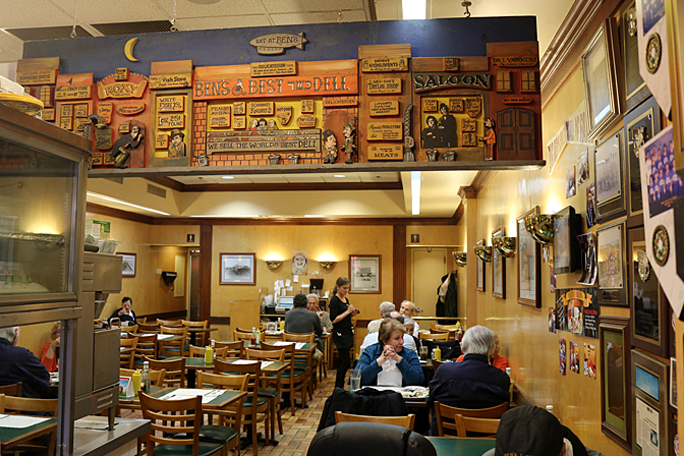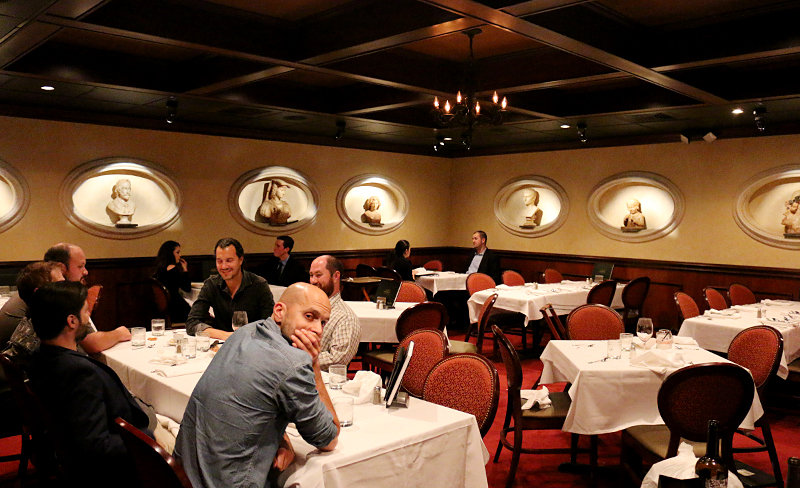Restaurants have been hit hard by the current 2019 Novel Coronavirus pandemic, as they were forced to close their dining areas and rely on customers to either take out their food, offer service at curbside, or accept delivery — sometimes free of charge as an incentive.
3 Things You Can Do About Restaurants Imposing Mandatory Surcharges Due to Pandemic

In addition to the substantial loss of income from a surfeit of closed dining rooms and reduced capacity for increased distancing between people over the past several months — which can be staggering enough to force a restaurant to either downsize or go out of business altogether — all of the cleaning, sanitizing, disinfecting and other costly measures have created deficits for restaurants and other dining establishments…
…all of which cost money. Who do you think is ultimately going to pay for all of that?
I warned in this article written on Thursday, May 21, 2020 to watch your bill before paying it when you dine out at a restaurant, as some dining establishments around the United States — including in California, Illinois, Michigan, and Missouri — have started a disturbing trend of adding a 2019 Novel Coronavirus surcharge on the checks of their customers…
…and now, reports of restaurants in Nevada, Florida, and other states engaging in the practice of adding surcharges to the bills of customers have surfaced.
Even worse is that sometimes the restaurant will disguise the surcharge with an opaque pseudonym. “On Saturday night at Rack’s Fish House + Oyster Bar in Delray Beach, Irina Simkhovich glanced down at her $857.43 check and spotted a fee at the bottom, below the stuffed shrimp: $23.43 for something called ‘D-Operations’”, according to this article written by . “Simkhovich and her party of seven flagged a server. ‘We’re like, “What’s this?”‘ she recalled. The server called over a manager, who explained ‘D-Operations’ was actually a COVID-19 surcharge — totaling 3 percent of the bill — so the restaurant could afford sanitation supplies.”
In Las Vegas, a photograph of a receipt on which a surcharge was added was posted to the official Twitter account of TravelZork.
It has begun #CovidSurcharge in Vegas #vegas #VegasAgain #VegasIsBack pic.twitter.com/nDzL5FbDdi
— ᴛʀᴀᴠᴇʟᴢᴏʀᴋ (@TravelZork) June 9, 2020
The supply chain of many industries worldwide has been severely disrupted to the point that companies are scrambling to recover as a result of what I always have considered to be a gross overreaction to the 2019 Novel Coronavirus pandemic…
…but when greater than 38 million people in the United States alone are unemployed only within the past three months — and that does not include people who were already unemployed prior to the current 2019 Novel Coronavirus pandemic; nor does that include self-employed people, owners of small companies, and freelancers who are suffering from a substantial loss of business — is implementing a potentially misleading surcharge really the answer?
If you believe the answer is no, here is what you can do.
1. Contact the Dining Establishment in Advance and Ask If They Add a Surcharge.
Contact representatives of the restaurants where you plan to dine either via telephone, e-mail message, or social media to find out if a surcharge is added to the bill — and if so, how much is that surcharge.
This way, you will be able to compare restaurants, which will help you decide on where you want to dine.
2. Avoid and Boycott the Restaurant.
If restaurants succeed with keeping menu prices constant but adding an arbitrary charge of as much as 26 percent to your bill — not including gratuity or tax — without giving you sufficient notice in advance, then why would restaurants stop the practice of doing so?
Remember that some airlines which added a surcharge when fuel prices were significantly more expensive some years ago kept adding that fee — which became known as a carrier-imposed surcharge, whatever that means — even as fuel prices decreased afterwards…
…and when lodging companies realized that they could get away with advertising low room rates — only to sock you with a mandatory resort fee buried somewhere in the final pricing of your folio — that “disease” only spread throughout the lodging industry.
Tips and gratuities at dining establishments are already controversial. If restaurants are successful at imposing a surcharge, why would they stop once food prices stabilize and they successfully recoup their costs?
I am not opposed to a business earning enough revenue to enjoy a profit; but if I receive a bill at a restaurant — or any other type of business, for that matter — which did not disclose that it charges a mandatory fee due to the current 2019 Novel Coronavirus pandemic but includes it at the end of the meal, I will not pay it. Period. End of story.
Avoid — and boycott — any dining establishment which employs adding arbitrary mandatory surcharges to the bill.
3. Negotiate. Or Complain.
If you simply cannot resist patronizing a certain dining establishment, negotiate with the person who is waiting on you or the proprietor of the establishment and see if you can either have the surcharge reduced — or, better yet, have it eliminated altogether.
If the surcharge was not clearly disclosed prior to having your order taken, complain. In a number of jurisdictions, not disclosing surcharges until paying the bill is illegal.
An Erosion of Trust
Regardless of the reason, imposing mandatory surcharges on unsuspecting customers is flat out wrong, betrays the trust of customers, and is no different than mandatory resort fees and their ilk which are automatically added to the folios of guests of hotel and resort properties.
Dining establishments are far from the only entities which were adversely affected by the current 2019 Novel Coronavirus pandemic — which is why customers are currently seeking deals at restaurants and not looking to be surprised with fees and surcharges.
Similarly, the office of a dentist in Jacksonville has reportedly been charging patients ten extra dollars per appointment to cover the cost of personal protective equipment; and some hair salons in Houston have reportedly started adding a sanitation charge of three dollars for each customer.
The bottom line is that if a lodging company, airline, restaurant, salon, or other business entity needs additional revenue, be honest: simply raise prices for its products and services. Adding a 2019 Novel Coronavirus surcharge on the bills of customers is deceptive at best and is no better than mandatory resort fees — and can only serve to potentially erode trust from its customers.
A History of Articles Pertaining to Mandatory Resort Fees
That I vehemently oppose the implementation of mandatory resort fees, facilities fees and destination fees is no secret to you if you have been a reader of The Gate for years — they should either be optional or eliminated altogether — and I will just let this extensive body of work over the years pertaining to mandatory resort fees speak for me…
- Resort Fees and Parking Fees Temporarily Eliminated in Las Vegas at These Hotel and Casino Properties
- Greater Than 15 Percent Increase in Mandatory Resort Fees in Las Vegas at…
- Mandatory Resort Fees to Increase at Four Hotels March 2020 in Las Vegas
- Resort Fee Class Action Settlement 2019: Your Chance to Get Your Share of Money or Points From Wyndham Hotel Group
- Search Rankings Lowered For Hotels Which Charge Resort Fees: Expedia Group
- Deceptive Hotel Resort Fees: Legislation Introduced to Protect Consumers 2019
- Mandatory Resort Fees Increase at Three MGM Hotel and Casino Properties in Las Vegas
- Hilton Sued For Charging Deceptive Resort Fees by Attorney General of Nebraska
- Resort Fees are Here to Stay, According to the Chief Executive Officer of Marriott International
- The Importance of Not Abusing Trust
- Marriott International Sued For Charging Deceptive Resort Fees by Attorney General of District of Columbia
- One Simple Way to Reclaim That Resort Fee Which You Paid
- Even Worse: Mandatory Resort Fees as Percentage of Room Rate
- Why Are You Surprised That Resort Fees “Provide Real Tangible Value” to You?
- 4 Reasons Why Mandatory Resort Fees May Finally Be Disappearing
- Wait a Minute…A Hostel Which Charges a Resort Fee?!?
- Probe of Hotel Booking Sites Results in Enforcement Action in the United Kingdom
- Is This Flat Sales Tax Really a Mandatory Resort Fee in Disguise?
- Resort Fees: The Database of Lodging Options Which Charge Them
- Is This Secret to Ease the Pain of Paying Resort Fees Viable?
- The Destination Fee Plague Spreads Again — This Time, To…
- Another Way Mandatory Resort Fees are Deceptive
- Caesar’s Entertainment Properties to Increase Mandatory Resort Fees
- Resort Fees; Then Parking Fees: Are Free Drinks in Las Vegas In Jeopardy?
- What is Included in a Mandatory Resort Fee of $160.50 Per Night?
- Legislation Targets “Deceptive” Resort Fees
- New Parking Fees at Hotels: When Mandatory Resort Fees are Not Enough
- I Want In on This Resort Fee Nonsense: Open My Own Resort
- It’s Time to Put the Kibosh on Hotel Resort Fees? Now?!?
- Mandatory Resort Fees Can Add Up to 50% More to Your Room Rate With Useless Amenities
- Mandatory Facilities Fee: A Growing Deceptive Trend in Lodging?
- Help Me List Hotel Properties Here to Fight Resort Fees
- What If Other Businesses Surprised You With the Equivalent of Resort Fees?
- $40 Resort Fee at the Andaz Maui at Wailea Resort Starts June 1, 2015
- Lawsuit Alleges Daily Resort Fee Was Hidden From Room Rate at Booking
- Mandatory Daily “Facilities” Fee? Time For a Boycott?
- Who Likes Resort Fees? Not Me
- A Resort Fee Added on a $36 Rodeway Inn Room?
Summary
The hard truth is that if a restaurant, lodging company, airline — or virtually any business, for that matter — cannot find ways to afford to survive which are not considered deceptive, then it should go out of business. That may sound harsh; but although exceptions may come to mind, the free market forces of supply and demand — as well as what customers are willing to pay for a product or service — should ultimately determine whether a company should stay in business.
Lodging companies have been known to not only charge mandatory resort fees — or destination fees or similar mandatory fees — but they have also been known to sneak in other fees during the best of times. Back in December of 2019, I was automatically charged a fee for the use of a safe which I never used; and yet, the hotel property even had the nerve to disclaim that they are not responsible for valuables kept in the safe — despite charging that deceptive and worthless fee…
…which causes me to wonder just how far they will go in charging fees to their guests now that times are not so good.
Photograph ©2015 by Brian Cohen.

